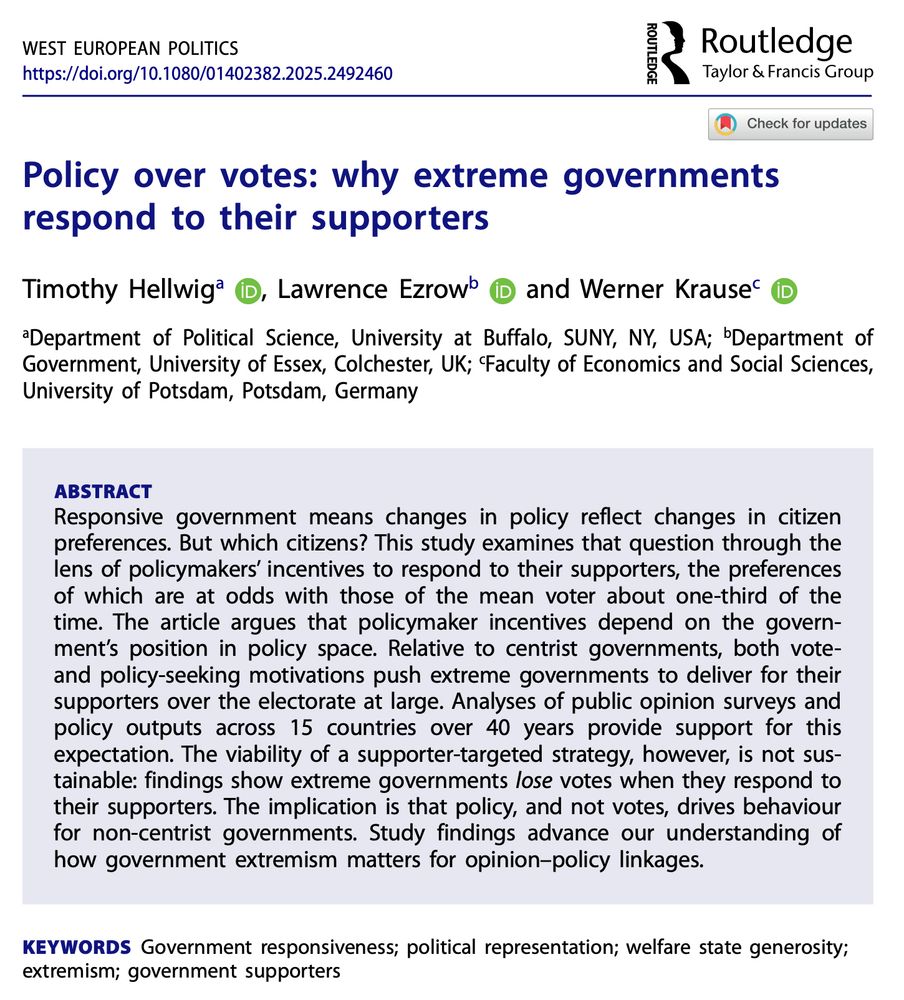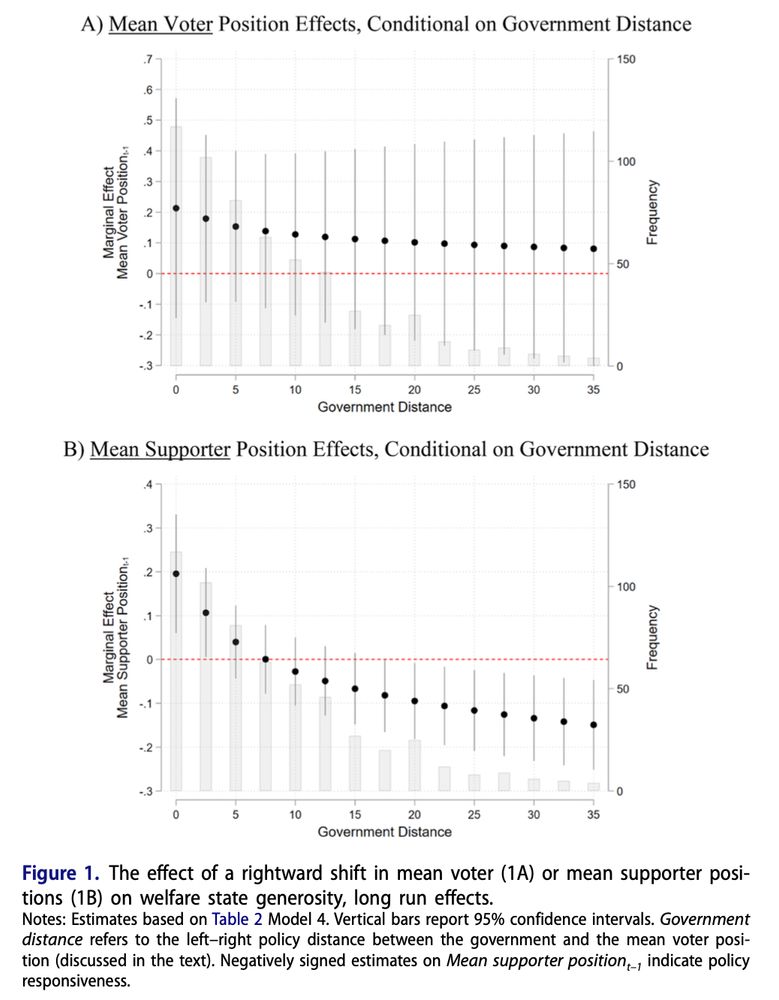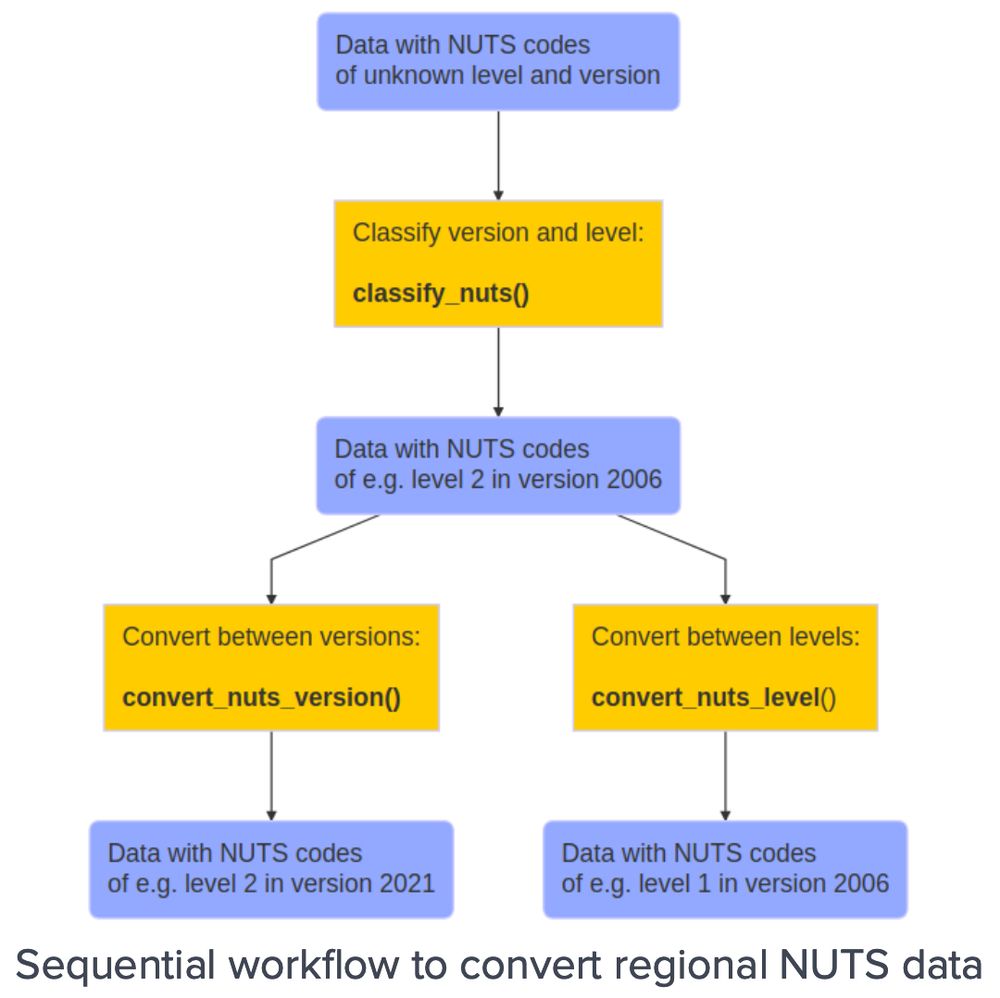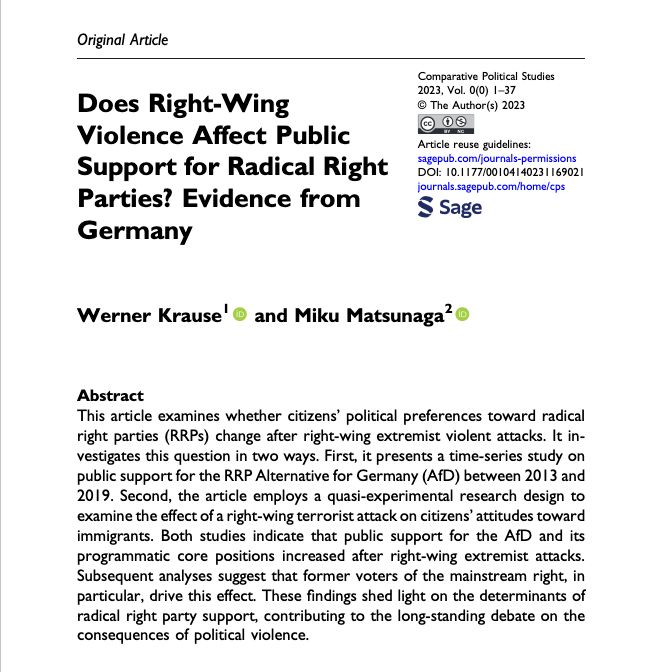Werner Krause
@krausewe.bsky.social
Political Scientist @unipotsdam.bsky.social
- Comparative Politics, Political Parties & Voting Behavior
- Quantitative Methods & R
Prev. Uni Vienna, Humboldt Uni & WZB Berlin
https://krausewe.github.io
- Comparative Politics, Political Parties & Voting Behavior
- Quantitative Methods & R
Prev. Uni Vienna, Humboldt Uni & WZB Berlin
https://krausewe.github.io
Very excited to spend four weeks as an academic visitor @nuffieldcollege.bsky.social, @ox.ac.uk, continuing research on political parties, voters, and elections.
Drop me a message if you wanna meet for a coffee!
Drop me a message if you wanna meet for a coffee!

October 16, 2025 at 7:59 AM
Very excited to spend four weeks as an academic visitor @nuffieldcollege.bsky.social, @ox.ac.uk, continuing research on political parties, voters, and elections.
Drop me a message if you wanna meet for a coffee!
Drop me a message if you wanna meet for a coffee!
New publication @wepsocial.bsky.social w/ Timothy Hellwig and Lawrence Ezrow!
We argue and show that non-centrist/extreme governments prioritize their core supporters over the median voter when making policy.
However, this strategy is likely to backfire at the next election.
tinyurl.com/ynexbzwh
We argue and show that non-centrist/extreme governments prioritize their core supporters over the median voter when making policy.
However, this strategy is likely to backfire at the next election.
tinyurl.com/ynexbzwh


May 23, 2025 at 6:37 AM
New publication @wepsocial.bsky.social w/ Timothy Hellwig and Lawrence Ezrow!
We argue and show that non-centrist/extreme governments prioritize their core supporters over the median voter when making policy.
However, this strategy is likely to backfire at the next election.
tinyurl.com/ynexbzwh
We argue and show that non-centrist/extreme governments prioritize their core supporters over the median voter when making policy.
However, this strategy is likely to backfire at the next election.
tinyurl.com/ynexbzwh
Wichtig ist auch: Der von uns gemessene Effekt verringert sich signifikant, sobald die statistischen Unsicherheiten von Umfragen klar kommuniziert werden.
Link zum Working Paper: www.dropbox.com/scl/fi/0kbs6...
Link zum Working Paper: www.dropbox.com/scl/fi/0kbs6...

February 21, 2025 at 8:38 AM
Wichtig ist auch: Der von uns gemessene Effekt verringert sich signifikant, sobald die statistischen Unsicherheiten von Umfragen klar kommuniziert werden.
Link zum Working Paper: www.dropbox.com/scl/fi/0kbs6...
Link zum Working Paper: www.dropbox.com/scl/fi/0kbs6...
Die Süddeutsche Zeitung ( @basbrinkmann.bsky.social ) berichtet heute auf Seite 1 ihrer Print-Ausgabe über unser Projekt zum Einfluss der Sonntagsfrage auf die Erfolgsaussichten von Parteien an der 5%-Hürde.
Link zum Onlinebeitrag: www.sueddeutsche.de/politik/bund...
Link zum Onlinebeitrag: www.sueddeutsche.de/politik/bund...

February 6, 2025 at 9:16 AM
Die Süddeutsche Zeitung ( @basbrinkmann.bsky.social ) berichtet heute auf Seite 1 ihrer Print-Ausgabe über unser Projekt zum Einfluss der Sonntagsfrage auf die Erfolgsaussichten von Parteien an der 5%-Hürde.
Link zum Onlinebeitrag: www.sueddeutsche.de/politik/bund...
Link zum Onlinebeitrag: www.sueddeutsche.de/politik/bund...
Das Ergebnis:
Wurden die statistischen Unsicherheiten klar kommuniziert, stieg die Bereitschaft zur KPÖ-Wahl.
Vor allem linke Wähler:innen ließen sich von der 4%-Hürde weniger abschrecken, wenn sie die Schwankungsbreiten des KPÖ-Werts kannten.
6/7
Wurden die statistischen Unsicherheiten klar kommuniziert, stieg die Bereitschaft zur KPÖ-Wahl.
Vor allem linke Wähler:innen ließen sich von der 4%-Hürde weniger abschrecken, wenn sie die Schwankungsbreiten des KPÖ-Werts kannten.
6/7

February 4, 2025 at 12:11 PM
Das Ergebnis:
Wurden die statistischen Unsicherheiten klar kommuniziert, stieg die Bereitschaft zur KPÖ-Wahl.
Vor allem linke Wähler:innen ließen sich von der 4%-Hürde weniger abschrecken, wenn sie die Schwankungsbreiten des KPÖ-Werts kannten.
6/7
Wurden die statistischen Unsicherheiten klar kommuniziert, stieg die Bereitschaft zur KPÖ-Wahl.
Vor allem linke Wähler:innen ließen sich von der 4%-Hürde weniger abschrecken, wenn sie die Schwankungsbreiten des KPÖ-Werts kannten.
6/7
Um die Wirkung dieser Unsicherheiten in Umfragen direkt zu testen, haben wir ein Experiment in Österreich durchgeführt.
Teilnehmende unseres Surveys sahen Umfragen mit und ohne Schwankungsbreiten.
Die KPÖ lag hier nah an, aber knapp unterhalb der 4%-Hürde.
5/7
Teilnehmende unseres Surveys sahen Umfragen mit und ohne Schwankungsbreiten.
Die KPÖ lag hier nah an, aber knapp unterhalb der 4%-Hürde.
5/7

February 4, 2025 at 12:11 PM
Um die Wirkung dieser Unsicherheiten in Umfragen direkt zu testen, haben wir ein Experiment in Österreich durchgeführt.
Teilnehmende unseres Surveys sahen Umfragen mit und ohne Schwankungsbreiten.
Die KPÖ lag hier nah an, aber knapp unterhalb der 4%-Hürde.
5/7
Teilnehmende unseres Surveys sahen Umfragen mit und ohne Schwankungsbreiten.
Die KPÖ lag hier nah an, aber knapp unterhalb der 4%-Hürde.
5/7
Das Ergebnis:
Parteien, die in Umfragen knapp unter der Sperrklausel lagen, hatten eine signifikant geringere Chance, ins Parlament einzuziehen.
Dieser Unterschied verringert sich jedoch, wenn Wähler:innen Hinweise auf die (statistischen) Unsicherheiten von Umfragewerten hatten.
4/7
Parteien, die in Umfragen knapp unter der Sperrklausel lagen, hatten eine signifikant geringere Chance, ins Parlament einzuziehen.
Dieser Unterschied verringert sich jedoch, wenn Wähler:innen Hinweise auf die (statistischen) Unsicherheiten von Umfragewerten hatten.
4/7

February 4, 2025 at 12:11 PM
Das Ergebnis:
Parteien, die in Umfragen knapp unter der Sperrklausel lagen, hatten eine signifikant geringere Chance, ins Parlament einzuziehen.
Dieser Unterschied verringert sich jedoch, wenn Wähler:innen Hinweise auf die (statistischen) Unsicherheiten von Umfragewerten hatten.
4/7
Parteien, die in Umfragen knapp unter der Sperrklausel lagen, hatten eine signifikant geringere Chance, ins Parlament einzuziehen.
Dieser Unterschied verringert sich jedoch, wenn Wähler:innen Hinweise auf die (statistischen) Unsicherheiten von Umfragewerten hatten.
4/7
Um diese Folgen zu messen, schauen wir auf Wahlergebnisse aus 19 Ländern und analysieren 903 Parteiergebnisse.
Wir vergleichen Parteien, die unmittelbar vor einer Wahl in Umfragen knapp über der Sperrklausel lagen, mit denen knapp darunter.
Dazu nutzen wir ein Regression Discontinuity Design.
3/7
Wir vergleichen Parteien, die unmittelbar vor einer Wahl in Umfragen knapp über der Sperrklausel lagen, mit denen knapp darunter.
Dazu nutzen wir ein Regression Discontinuity Design.
3/7

February 4, 2025 at 12:11 PM
Um diese Folgen zu messen, schauen wir auf Wahlergebnisse aus 19 Ländern und analysieren 903 Parteiergebnisse.
Wir vergleichen Parteien, die unmittelbar vor einer Wahl in Umfragen knapp über der Sperrklausel lagen, mit denen knapp darunter.
Dazu nutzen wir ein Regression Discontinuity Design.
3/7
Wir vergleichen Parteien, die unmittelbar vor einer Wahl in Umfragen knapp über der Sperrklausel lagen, mit denen knapp darunter.
Dazu nutzen wir ein Regression Discontinuity Design.
3/7
Aktuell liegen 3 Parteien in den Umfragen an der 5%-Hürde.
Doch was bedeutet das für ihre Wahlchancen?
Neue Studie mit @christinagahn.bsky.social!
Wir zeigen, dass Parteien, die auch nur knapp unter der Sperrklausel liegen, eine signifikant geringere Chance haben, ins Parlament einzuziehen.
1/7
Doch was bedeutet das für ihre Wahlchancen?
Neue Studie mit @christinagahn.bsky.social!
Wir zeigen, dass Parteien, die auch nur knapp unter der Sperrklausel liegen, eine signifikant geringere Chance haben, ins Parlament einzuziehen.
1/7


February 4, 2025 at 12:11 PM
Aktuell liegen 3 Parteien in den Umfragen an der 5%-Hürde.
Doch was bedeutet das für ihre Wahlchancen?
Neue Studie mit @christinagahn.bsky.social!
Wir zeigen, dass Parteien, die auch nur knapp unter der Sperrklausel liegen, eine signifikant geringere Chance haben, ins Parlament einzuziehen.
1/7
Doch was bedeutet das für ihre Wahlchancen?
Neue Studie mit @christinagahn.bsky.social!
Wir zeigen, dass Parteien, die auch nur knapp unter der Sperrklausel liegen, eine signifikant geringere Chance haben, ins Parlament einzuziehen.
1/7
The package also automatically detects the correct NUTS version and level in your data making transformation to other versions easy.
As a plus: Our functions can also deal with multiple NUTS versions in one and the same data set.
3/4
As a plus: Our functions can also deal with multiple NUTS versions in one and the same data set.
3/4

March 27, 2024 at 10:25 AM
The package also automatically detects the correct NUTS version and level in your data making transformation to other versions easy.
As a plus: Our functions can also deal with multiple NUTS versions in one and the same data set.
3/4
As a plus: Our functions can also deal with multiple NUTS versions in one and the same data set.
3/4
The package uses (dasymetric) spatial interpolation to harmonize data by @eu-eurostat-mirror.bsky.social or other European data.
Based on granular geodata [100m x 100m] provided by
the JCR of the EC, you can use five different weights (area, 2011/2018 pop size, 2012/2018 built-up area).
2/4
Based on granular geodata [100m x 100m] provided by
the JCR of the EC, you can use five different weights (area, 2011/2018 pop size, 2012/2018 built-up area).
2/4


March 27, 2024 at 10:25 AM
The package uses (dasymetric) spatial interpolation to harmonize data by @eu-eurostat-mirror.bsky.social or other European data.
Based on granular geodata [100m x 100m] provided by
the JCR of the EC, you can use five different weights (area, 2011/2018 pop size, 2012/2018 built-up area).
2/4
Based on granular geodata [100m x 100m] provided by
the JCR of the EC, you can use five different weights (area, 2011/2018 pop size, 2012/2018 built-up area).
2/4
Excited to share a new R-package (written w/
@aaoritz.bsky.social)!
"nuts: Convert European regional data in R"
tinyurl.com/4yhbnpxn
nuts allows to harmonize and aggregate European regional data across all NUTS versions (2006, 2010, 2013, 2016, 2021) & levels (NUTS-3 to NUTS-1).
1/4
@aaoritz.bsky.social)!
"nuts: Convert European regional data in R"
tinyurl.com/4yhbnpxn
nuts allows to harmonize and aggregate European regional data across all NUTS versions (2006, 2010, 2013, 2016, 2021) & levels (NUTS-3 to NUTS-1).
1/4

March 27, 2024 at 10:22 AM
Excited to share a new R-package (written w/
@aaoritz.bsky.social)!
"nuts: Convert European regional data in R"
tinyurl.com/4yhbnpxn
nuts allows to harmonize and aggregate European regional data across all NUTS versions (2006, 2010, 2013, 2016, 2021) & levels (NUTS-3 to NUTS-1).
1/4
@aaoritz.bsky.social)!
"nuts: Convert European regional data in R"
tinyurl.com/4yhbnpxn
nuts allows to harmonize and aggregate European regional data across all NUTS versions (2006, 2010, 2013, 2016, 2021) & levels (NUTS-3 to NUTS-1).
1/4
🚨 Job Offer
I am looking for a postdoc for my DFG-project “Powerful Polls” (University of Potsdam).
Start date: October 1, 2024 (latest)
Please share widely and apply!
Do not hesitate to get in touch in case of questions.
Full job ad: www.uni-potsdam.de/fileadmin/pr...
I am looking for a postdoc for my DFG-project “Powerful Polls” (University of Potsdam).
Start date: October 1, 2024 (latest)
Please share widely and apply!
Do not hesitate to get in touch in case of questions.
Full job ad: www.uni-potsdam.de/fileadmin/pr...

March 25, 2024 at 12:52 PM
🚨 Job Offer
I am looking for a postdoc for my DFG-project “Powerful Polls” (University of Potsdam).
Start date: October 1, 2024 (latest)
Please share widely and apply!
Do not hesitate to get in touch in case of questions.
Full job ad: www.uni-potsdam.de/fileadmin/pr...
I am looking for a postdoc for my DFG-project “Powerful Polls” (University of Potsdam).
Start date: October 1, 2024 (latest)
Please share widely and apply!
Do not hesitate to get in touch in case of questions.
Full job ad: www.uni-potsdam.de/fileadmin/pr...
Happy to announce a major update to the PPEG database!
We've updated the data on
- parliamentary elections (n=1060),
- presidential elections (n=380), and
- cabinets (n=1961)
covering 73 countries globally until 2023.
All info: ppeg.wzb.eu
We hope that data is helpful to the community!
We've updated the data on
- parliamentary elections (n=1060),
- presidential elections (n=380), and
- cabinets (n=1961)
covering 73 countries globally until 2023.
All info: ppeg.wzb.eu
We hope that data is helpful to the community!

February 16, 2024 at 8:10 AM
Happy to announce a major update to the PPEG database!
We've updated the data on
- parliamentary elections (n=1060),
- presidential elections (n=380), and
- cabinets (n=1961)
covering 73 countries globally until 2023.
All info: ppeg.wzb.eu
We hope that data is helpful to the community!
We've updated the data on
- parliamentary elections (n=1060),
- presidential elections (n=380), and
- cabinets (n=1961)
covering 73 countries globally until 2023.
All info: ppeg.wzb.eu
We hope that data is helpful to the community!
4/4
Key Findings:
- MoEs can significantly influence citizens' voting choices, particularly in closely contested electoral races.
- Interpretative guidance plays a pivotal role in shaping voters' responses.
- This points to journalistic influence as a decisive factor.
Key Findings:
- MoEs can significantly influence citizens' voting choices, particularly in closely contested electoral races.
- Interpretative guidance plays a pivotal role in shaping voters' responses.
- This points to journalistic influence as a decisive factor.


November 27, 2023 at 12:12 PM
4/4
Key Findings:
- MoEs can significantly influence citizens' voting choices, particularly in closely contested electoral races.
- Interpretative guidance plays a pivotal role in shaping voters' responses.
- This points to journalistic influence as a decisive factor.
Key Findings:
- MoEs can significantly influence citizens' voting choices, particularly in closely contested electoral races.
- Interpretative guidance plays a pivotal role in shaping voters' responses.
- This points to journalistic influence as a decisive factor.
3/4
We test this using a vignette experiment prior to the 2021 German election.
Respondents were shown different polls w/ & w/o MoEs.
We also varied the polling gaps & added interpretative guidance, emphasizing or downplaying the closeness of the race.
We test this using a vignette experiment prior to the 2021 German election.
Respondents were shown different polls w/ & w/o MoEs.
We also varied the polling gaps & added interpretative guidance, emphasizing or downplaying the closeness of the race.


November 27, 2023 at 12:12 PM
3/4
We test this using a vignette experiment prior to the 2021 German election.
Respondents were shown different polls w/ & w/o MoEs.
We also varied the polling gaps & added interpretative guidance, emphasizing or downplaying the closeness of the race.
We test this using a vignette experiment prior to the 2021 German election.
Respondents were shown different polls w/ & w/o MoEs.
We also varied the polling gaps & added interpretative guidance, emphasizing or downplaying the closeness of the race.
2/4
Voters are exposed to an increasing number of polling results prior to election day. At the same time, elections are frequently won only by small winning margins.
Would voters change their voting decisions if MoEs signaled that an electoral race is tightly contested?
Voters are exposed to an increasing number of polling results prior to election day. At the same time, elections are frequently won only by small winning margins.
Would voters change their voting decisions if MoEs signaled that an electoral race is tightly contested?

November 27, 2023 at 12:11 PM
2/4
Voters are exposed to an increasing number of polling results prior to election day. At the same time, elections are frequently won only by small winning margins.
Would voters change their voting decisions if MoEs signaled that an electoral race is tightly contested?
Voters are exposed to an increasing number of polling results prior to election day. At the same time, elections are frequently won only by small winning margins.
Would voters change their voting decisions if MoEs signaled that an electoral race is tightly contested?
1/4 New article at EJPR!
@ChristinaGahn & I explore the impact of displaying margins of error (MoE) in public opinion polls on citizens' voting intentions.
We use a vignette experiment with > 3000 respondents in Germany.
Paper (Open Access): tinyurl.com/y28fvfk8
polisky commsky polcom
@ChristinaGahn & I explore the impact of displaying margins of error (MoE) in public opinion polls on citizens' voting intentions.
We use a vignette experiment with > 3000 respondents in Germany.
Paper (Open Access): tinyurl.com/y28fvfk8
polisky commsky polcom

November 27, 2023 at 12:11 PM
1/4 New article at EJPR!
@ChristinaGahn & I explore the impact of displaying margins of error (MoE) in public opinion polls on citizens' voting intentions.
We use a vignette experiment with > 3000 respondents in Germany.
Paper (Open Access): tinyurl.com/y28fvfk8
polisky commsky polcom
@ChristinaGahn & I explore the impact of displaying margins of error (MoE) in public opinion polls on citizens' voting intentions.
We use a vignette experiment with > 3000 respondents in Germany.
Paper (Open Access): tinyurl.com/y28fvfk8
polisky commsky polcom
"Does Right-Wing Violence Affect Public Support for Radical Right Parties? Evidence from Germany"
Now out in @cpsjournal.bsky.social with page numbers!
Blog Post: theloop.ecpr.eu/right-wing-v...
Full Article (Open Access): journals.sagepub.com/doi/full/10.11
Now out in @cpsjournal.bsky.social with page numbers!
Blog Post: theloop.ecpr.eu/right-wing-v...
Full Article (Open Access): journals.sagepub.com/doi/full/10.11

November 14, 2023 at 1:38 PM
"Does Right-Wing Violence Affect Public Support for Radical Right Parties? Evidence from Germany"
Now out in @cpsjournal.bsky.social with page numbers!
Blog Post: theloop.ecpr.eu/right-wing-v...
Full Article (Open Access): journals.sagepub.com/doi/full/10.11
Now out in @cpsjournal.bsky.social with page numbers!
Blog Post: theloop.ecpr.eu/right-wing-v...
Full Article (Open Access): journals.sagepub.com/doi/full/10.11

